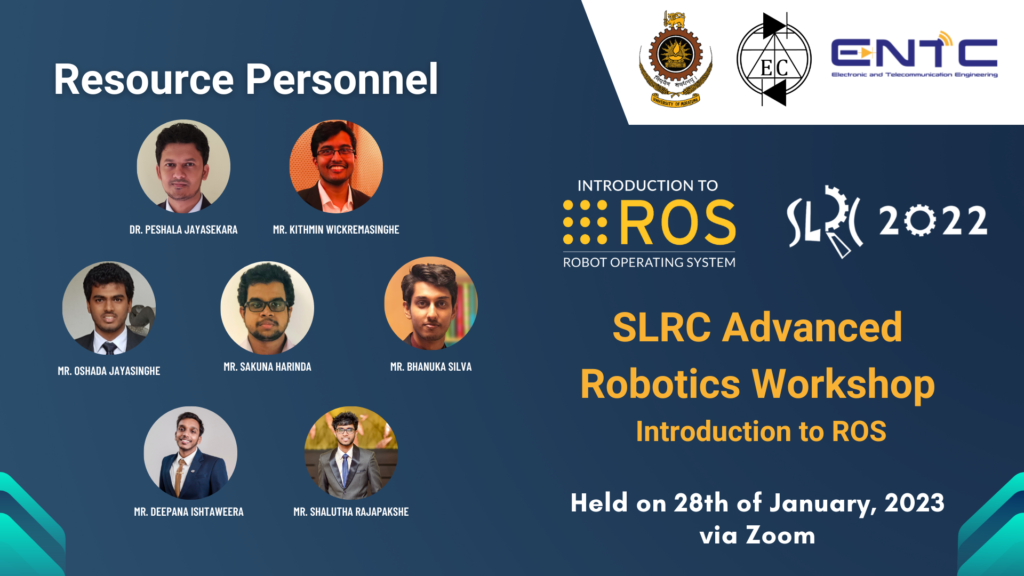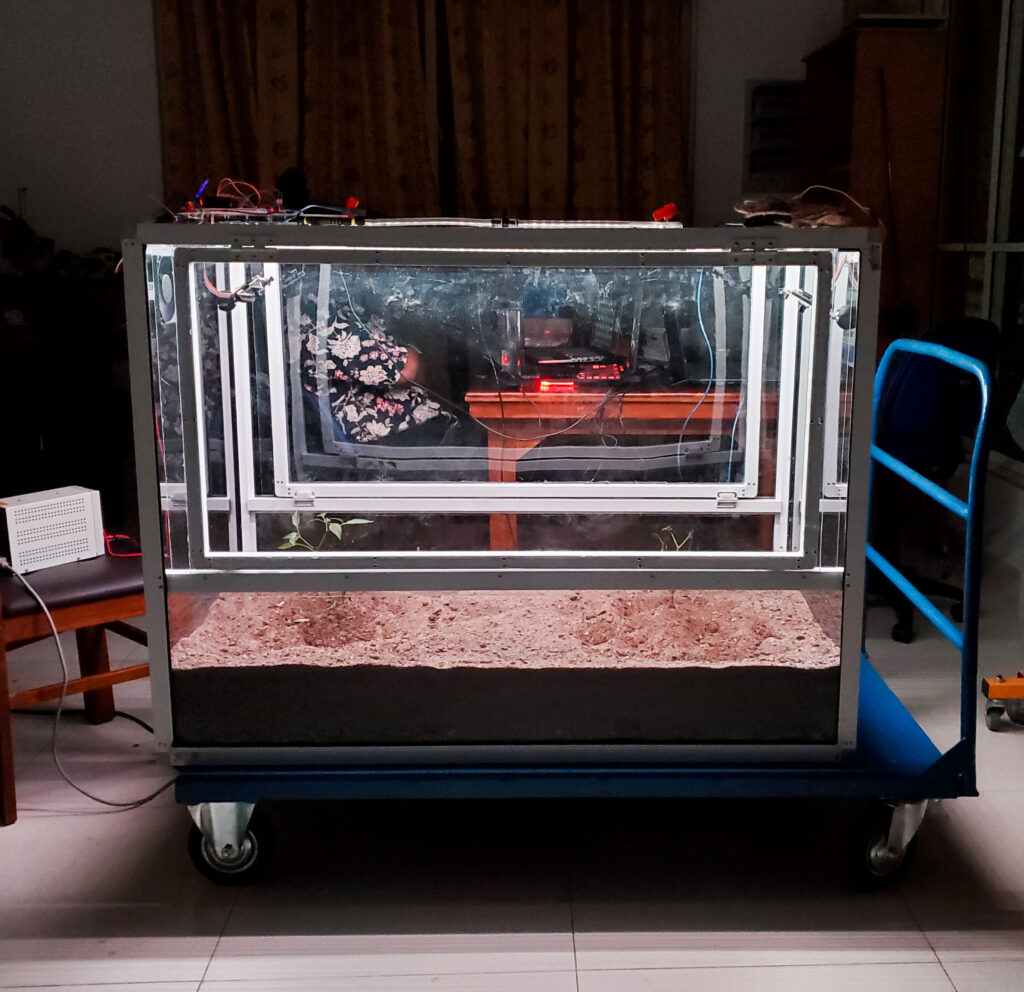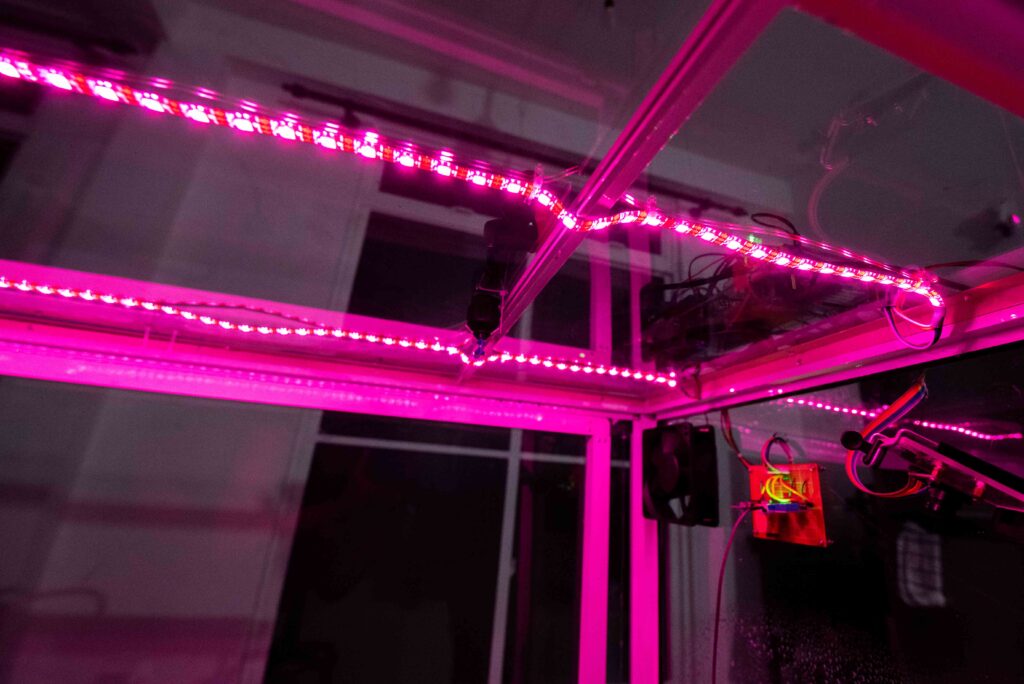SLRC 22 Advanced Robotics Workshop: A Journey into the Realm of ROS

The Sri Lankan Robotics Challenge (SLRC) is an exciting place to promote robotics education and research in Sri Lanka. The SLRC branch of Electronic Club, Department of Electronic and Telecommunication Engineering (ENTC), University of Moratuwa (UoM) hosted a one-day online workshop titled “Introduction to Robot Operating System (ROS)” in conjunction with the SLRC 22/23 competition on January 28th, 2023. The workshop aimed at anyone who was interested in developing advanced robotic systems using ROS.
The instructor panel included fully competent resource personnels led by Dr. Peshala Jayasekara, a senior lecturer at ENTC, UoM, as well as few other ENTC graduates namely Mr.Kithmin Wickramasinghe, Mr. Bhanuka Silva, Mr Oshada Jayasinghe, Mr Sakuna Harinda , Mr Deepana Ishtaweera and Mr Shalutha Rajapaksha who extended their fullest support to make the event a success.
The program kicked off with an overview of the fundamentals of ROS, including its architecture, communication strategy, and message passing framework. Afterward, the participants were guided through creating a basic robot system in ROS utilizing its various tools and libraries. The participants were given access to a virtual environment to practice designing and developing robots with ROS. Robot sensors and actuators, robot control, and computer vision were just a few of the more complex topics that were covered in the program. The instructor panel also provided participants with tips and best practices for building robust and efficient robotic systems using ROS.
Throughout the day, participants were encouraged to ask questions and seek guidance from the instructors. This created a collaborative and supportive learning environment where participants could learn from each other’s experiences and insights. The workshop was attended by a 140+ diverse group of participants, including school students, undergraduates, and professionals from various industries from all over Sri Lanka and beyond.
At the end, the participants’ feedback was overwhelmingly positive, with many praising the workshop’s worth for their professional development and the caliber of the training. The SLRC received acclaim from participants for offering such a forum for free robotics study and networking with like-minded people.
Overall, the SLRC’s one-day online ROS program was a huge success, giving participants a firm grounding in both advanced robotics principles and ROS. The event served as an invaluable resource for anyone interested in using ROS to construct sophisticated robotic systems and demonstrated the SLRC’s dedication to promoting robotics in Sri Lanka.
Dulini Himeka
Read MoreInnovateFPGA Design Contest 21/22. Asia Pacific and Japan Region – Gold Award for Team AP116 from University of Moratuwa
Our team, AP116, comprised of Pahan Mendis, Chathuni Wijegunawardana and Pamuditha Somarathne from the Department of Electronics and Telecommunication Engineering at University of Moratuwa has won the Asia Pacific and Japan Regional Gold Award at the InnovateFPGA Design Contest 21/22. We convey our gratitude to our valuable advisors, Dr.Ajith Pasqual, Mr.Abarajithan Gnaneswaran and Mr.Kithmin Wickremasinghe.
InnovateFPGA Design Contest is a competition organized by Terasic Inc. in collaboration with the Intel Corporation, Microsoft, Analog Devices, Inc., Arrow Electronics Inc., Macnica Inc., Mouser Electronics, Inc., and Digi-key Electronics. We have been invited to the Grand Finals in Intel Innovation Campus in San Jose, California where the top 12 teams from four regions in the world will present their projects.
This year, the contest focused on exploring solutions that reduces environmental impact and the demand that we place on the planet’s resources. To address this objective, our team brought forth a concept of the Green Machine, a smart, user-friendly, domestic mini-greenhouse system to enable users to grow and efficiently monitor and tend to plants with much ease. This was designed for domestic user to grow their own food in their homes. Also, due its modular design, the farmers can combine multiple units of Green Machines for cultivation in small to large scale farms. The condition within the Green Machine is monitored using a set of sensors and cameras and the sensor and image data is sent to the Terasic DE-10 Nano, a development kit based on Intel CycloneV FPGA, for processing.
The Cyclone® V SoC FPGA HPS consists of a dual-core ARM Cortex-A9 MP Core processor and a rich set of peripherals, which gives the flexibility of programmable logic as well as the functionality of a processor (HPS). Our design makes use of the FPGA as well as the HPS optimally for acceleration and controlling.
The DE-10 Nano processes the obtained data to control the irrigation, ventilation and light needed for the plants for optimal growth and yield using a controller implemented on the Hard Processor System. Furthermore, a convolutional neural network is implemented on the DE-10 Nano to detect abnormalities in the plants. The FPGA portion was used for acceleration and was programmed using OpenCL Language.
After the processing, the sensor and image data are transferred to a Cosmos Database System on Microsoft Azure to be analyzed for further optimizations.
Through our project, we mainly focus on achieving two sustainable development goals.
Goal 2: Zero Hunger
Goal 12: Responsible Consumption and production.
Since the Green Machine is automated, it can be used by anyone. As it is optimized, the food productivity is higher, labor costs are lower, and resources are saved. So, the food can be produced at a lower cost.
As the plants are grown within a controlled environment, the need of pesticides is eliminated. Therefore, the safety and quality of food is ensured which provides significant health benefits. Because of the design aesthetics, the users can gain relaxation and satisfaction. Altogether, our Green Machine is just the first step of creating a vast eco-system that empowers sustainable agriculture.
The project video: https://www.youtube.com/watch?v=kD0ctF4-nac
The project link: https://www.innovatefpga.com/cgi-bin/innovate/teams.pl?Id=AP116&All=1



Dr. Ajith A. Pasqual Gets Elected as the President of the Sri Lanka Electronic Manufacturers and Exporters Association
Dr. Ajith A. Pasqual, a senior lecturer at the Department of Electronic and Telecommunication Engineering of the University of Moratuwa, has been elected as the president of the Sri Lanka Electronic Manufacturers and Exporters Association (SLEMEA). The aim of the association is to uplift Sri Lanka’s electronic manufacturing industry to boost the economic contribution through electronic exports. Dr. Pasqual will use his knowledge and experience in academia and industry to shoulder this task and bring about impactful changes in Sri Lanka’s the electronic manufacturing and export industry.
Read More
